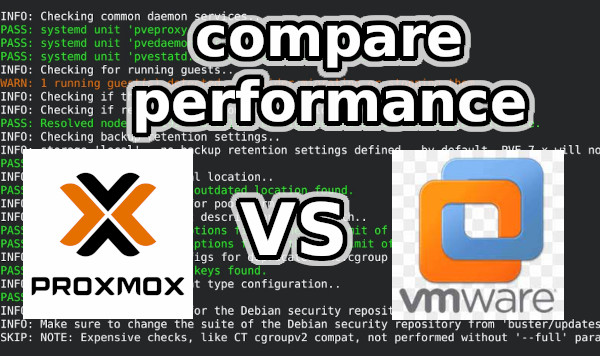VMware vs Proxmox: performance comparison
July 19, 2024VMware is often touted as a market leader. However, in the real world I have encountered that the performance of virtual servers running over VMware was inferior to Linux KVM (Proxmox). What are the specific performance differences between the two technologies?

VMware is often used by corporations and is considered a market leader. VMware was one of the first and best solutions on the market. But what is the situation today? Especially if we compare VMware with opensource solutions built on Linux.
Working for many years, one encounters situations that one would not expect to occur.
So I already know that anything is to be expected.
Most people get caught off guard by unexpected situations and get into an intractable situation.
The advantage of working with me is that I am able to diagnose unexpected and problematic situations.
And then suggest procedures on how the problem could be successfully resolved.
Thus, when I was in a situation where the same application, and subsequently the same configuration, showed worse results on paper on more powerful hardware,
I was only partially surprised. Consequently, I set about investigating the situation and testing to discover where the problem started.
Test parameters
I used the same versions of the software and operating system for testing:
- OS Linux distribution Debian.
- To make the environment easy to set up and import data automatically, I used Docker.
- The same version of MariaDBSQL server with the same data and the same configuration.
- The test consisted of running a specific SQL query.
To test this, I used a client application that generated challenging non-optimal SQL queries to the database. The drop in performance was thus all the more noticeable.
Test
For the tests I used various existing HW with a pre-built system.
There was no time and no reason or possibility to install VMware on the same HW.
I ran the same SQL query repeatedly over the same data. Used blah same version of MariaDB with identical configuration.
My server with Proxmox
A regular server with rotating disks and a VPS running on it in KVM. SQL query processing time: 0.7 seconds.
Disk performance test
# hdparm -Tt Timing cached reads: 27832 MB in 2.00 seconds = 13933.02 MB/sec Timing buffered disk reads: 610 MB in 3.01 seconds = 202.88 MB/sec
vpsFree
SQL query processing time: 3.7 seconds.
Notebook
My work laptop with NVMe disk, no virtualization. SQL query processing time: 0.9 seconds.
Server + VMware + rotating disk
Server with VMware and rotating disks. SQL query processing time: 1.76 seconds.
Disk performance test
# hdparm -Tt Timing cached reads: 6386 MB in 1.99 seconds = 3216.96 MB/sec Timing buffered disk reads: 920 MB in 3.00 seconds = 306.57 MB/sec
Server + VMware + SSD
Server with VMware and ssd drives. SQL query processing time: 1.69 seconds.
Disk performance test
# hdparm -Tt Timing cached reads: 15700 MB in 1.99 seconds = 7883.06 MB/sec Timing buffered disk reads: 1496 MB in 3.00 seconds = 498.02 MB/sec
Server + VMware + NVMe
Server with VMware and NVMe disks. SQL query processing time: 1.5 seconds.
Performance test of Samsung NVMe drives
# hdparm -Tt Timing cached reads: 18056 MB in 1.99 seconds = 9082.95 MB/sec Timing buffered disk reads: 2926 MB in 3.00 seconds = 974.79 MB/sec
Original KVM server
Original server with KVM virtualization. SQL query processing time: 0.8 seconds.
Test conclusion
As you can see, the results of Linux virtualization named KVM are significantly better than VMware.
This is even when comparing VMware combined with fast NVMe disks vs KVM with only rotating disks.
Specifically, this test shows that KVM provides better performance for disk IO operations.
Other Disadvantages of VMware
From a business perspective, there is also the risky VMware licensing policy.
It is therefore much more secure, and easier, to run a freely licensed solution such as Proxmox,
which is built on Linux and KVM.
If we take a purely technical point of view, the opensource solution built on Linux wins in terms of management and even performance.
And Proxmox in particular is a very user-friendly visualization tool.
So there is no reason to use VMware. Proxmox wins outright and is the clear choice in terms of price, maintenance and performance.
Proxmox complete virtualization solution
In addition to Proxmox VE, there is also Proxmox Backup Server, which I recommend installing. Proxmox Backup Server provides a simple and efficient way to back up virtual servers from Proxmox VE. By combining these two tools, you can provide your organization with a comprehensive visualization solution where you can run your applications and keep your data conveniently and securely.
Articles on a similar topic
SAP HANA database
Command AT
Docker build multiarch image
GitLab CI/CD: test automation and application deployment
Migrating VPS from VMware to Proxmox
VMware licensing change
Running Microsoft SQL Server on Linux
Backup: the Proxmox Backup Server
Linux as a router and firewall
How to upload a docker image to the Docker Registry
Linux: logical volume management
Linux Software RAID
Running a web application behind a proxy
Mailbox migration
Docker multistage build
Backing up your data by turning on your computer
Podman
Importing Windows into Proxmox virtualization
Docker and PHP mail
Proxmox virtualization
Docker and Cron
Lenovo ThinkPad X1 Carbon: LTE modem EM7544 commissioning
Yocto Project: Build custom operating system for embedded devices
Preparing a Linux server to run a web application in Python
How to address poor file share performance in Docker
How to get started using Docker correctly
Installing Linux on a dedicated HPE ProLiant DL320e server
How to stress test a web application
Why use the JFS filesystem
How to boot from a 4TB drive with GTP using UEFI
Btrfs file system
Raspberry PI
WINE - running Windous programs under Linux
GNU/Linux operating system
Newsletter
If you are interested in receiving occasional news by email.
You can register by filling in your email
news subscription.
+





